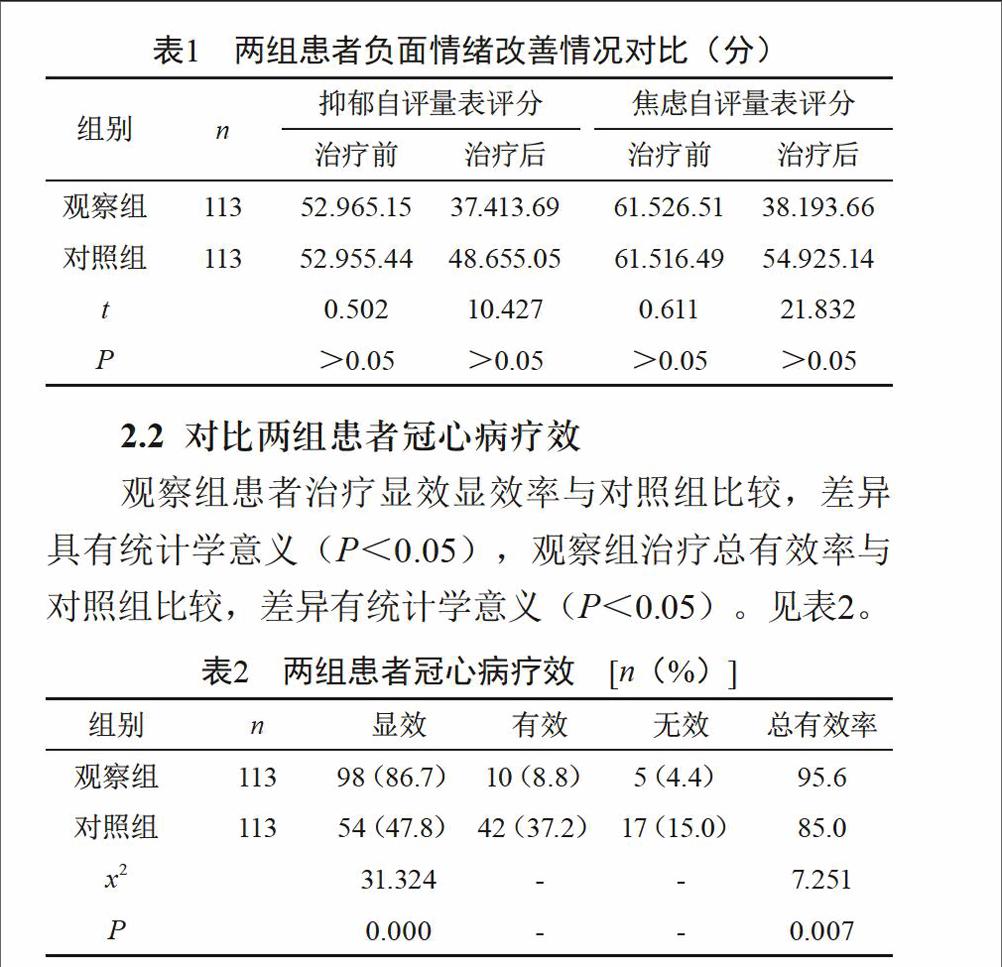分析心理护理改善老年冠心病患者负面情绪的效果
2015-07-25朱秀梅梅海慧
朱秀梅 梅海慧
【摘要】目的 探讨心理护理改善老年冠心病患者负面情绪的效果,总结临床经验。方法 本次研究选择我院2013月9月~2014年7月收治的226例老年冠心病患者作为研究对象,按照护理措施的不同分为观察组113例和对照组113例,对照组患者行常规护理措施,观察组在常规护理基础上实施综合心理护理干预,对比两组患者的疗效和焦虑、抑郁情绪改善情况。结果 护理治疗后,观察组患者抑郁评分、焦虑评分和治疗显效率都显著优于对照组,差异具有统计学意义(P<0.05),观察组治疗总有效率显著高于对照组,差异有统计学意义(P<0.05)。结论 心理护理干预应用于老年冠心病患者护理中效果明显,可有效改善患者负面情绪,降低患者焦虑和抑郁的程度。
【关键词】心理护理;老年冠心病患者;负面情绪
【中图分类号】R473.5 【文献标识码】B
Analysis of the effect of improving the psychological care of patients of coronary heart disease in elderly negative emotions
ZHU Xiu-mei,MEI Hai-hui
(Tang Yang Center Hospital, Jiangsu Dongtai 224200,China )
【Abstract】Objective Analysis of the effect of improving the psychological care of patients of coronary heart disease in elderly negative emotions, summarize clinical experience. Methods This study in our hospital in January 2013 to September October 2014 treated 226 cases of of coronary heart disease in elderly patients as research subjects, according to different nursing interventions into the observation group 113 cases and the control group 113 cases, the control group underwent routine care measures. Observation group implementing comprehensive psychological nursing intervention on the basis of routine care. Compared two groups of patients with the therapeutic effect and anxiety and depression to improve the situation. Results Treatment and after care. Depression scores in patients, anxiety score, the cure rate in the observation group is better than the control group. The difference was highly statistically significant (P<0.05). Total effective observation group was significantly higher, the difference was statistically significant (P<0.05). Conclusion Effect of psychological nursing intervention in elderly patients of coronary heart disease significantly, can effectively improve the patient's negative emotions and reduce the extent of the patient's anxiety and depression.
【Key words】Psychological care; Elderly patients with of coronary heart disease; Nnegative emotions
随着我国人口老龄化社会的到来和人们生活习惯与饮食结构的变化,我国冠心病发病率和致死率呈现出显著的逐年升高的态势,且越来越与欧美国家冠心病发病率接近[1]。大多数冠心病患者在病情发作和治疗过程中,均伴随不同程度的抑郁或者焦虑等负面情绪。这些负面情绪不仅会加重患者病情,还会对患者生活质量造成严重影响,甚至增加冠心病患者的死亡率。因此,冠心病患者在疾病治疗时需要增加有效的心理护理干预措施,引导患者改善负面情绪[2]。我院在本次研究中选择2013月9月~2014年7月收治的226例冠心病患者作为研究对象,并采取分组对照方式观察分析心理护理干预应用于冠心病患者护理中的疗效,现总结如下。
1 资料与方法
1.1 一般资料
本次研究中选取2013月9月~2014年7月到我院就诊的226例老年冠心病患者作为研究对象,所有患者在入院时均进行临床检查和抑郁自评量表与焦虑自评量表分析,确诊为冠心病,且伴随不同程度的抑郁和焦虑负面情绪。将其按照护理措施的不同分为观察组113例和对照组113例,观察组中男74例,女39例,年龄51~84岁,平均年龄(59.98±12.06)岁;对照组中男75例,女38例,年龄51~81岁,平均年龄(59.12±12.47)岁。两组患者性别、年龄及病情等临床资料比较差异均无统计学意义(P>0.05)。

